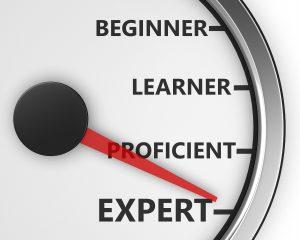
People who have deep knowledge of TPS (or Lean) typically claim they are not experts due to the vastness of problems and possible solutions. There is a solid rationale for this view. But the reality is they are experts compared to others who have far less knowledge and experience. I would rather learn TPS from an expert than a non-expert because the learning is better, faster, and more efficient. That is not to say there is nothing to learn from non-experts. There certainly is, because their unawareness is often very refreshing and leads to interesting and challenging questions or perspectives.
There are three categories of experts, all of whom serve a useful role in discovering and sharing knowledge, and expanding a body of knowledge:
- People who know a subject deeply from reading and studying
- People who know a subject deeply from hands-on experience
- People who know a subject deeply from both reading and studying and hands-on experience
Type 1 experts have encyclopedic knowledge of a subject. Their career focus is research directed towards understanding phenomena; to formulate and test theories. They are helpful guides for sorting good information from bad. Their work may involve laboratory experiments, which would extend one’s knowledge into a quasi-practical realm. Most university professors are of this type, in large part because “the system of higher education” (unable to overcome ingrained biases) demands it.
Type 2 experts have extensive knowledge of what to do or what not to do in the “real world.” These people have many years of work experience, often in different functional areas of an organization. Universities don’t find them attractive as teachers because they usually lack academic training in research (i.e. do not possess a terminal degree such as Ph.D.) and tend to teach mostly, if not entirely, by the re-telling of personal war-stories from their time in industry. While such experiential knowledge has value, it is incomplete or disconnected from the philosophy or theory of the subject matter.
Type 3 experts have extensive knowledge spans both theory and practice. They are rare compared to Types 1 and 2 because it takes extra effort (and risk) to gain both theoretical academic knowledge and practical knowledge from industrial work experience. They have obtained the terminal degree necessary to become a member of the university faculty responsible for teaching and conducting research. However, most universities have little interest in this type of expert because their extensive time in industry is understood by “the system of higher education” as a loss of many years of productive research activity. Yet, most students will tell you that Type 3 professors are usually the best teachers because their knowledge spans from theory to practice.
I value all three types of experts, as well as non-experts. To be prejudiced against any of these types of experts reflects closed-mindedness and an unwillingness to learn. Therefore, one expects that Lean people, being life-long learners, would respect all three types of experts, as well as non-experts. But often, they do not. Most seem to put their entire faith in Type 2 experts and largely dismiss Type 1 and Type 3 experts. That is a mistake. And it accounts for some of the big problems that exist in Lean-world, which I have written extensively about. In general, Type 2 experts are not interested in correcting big problems. But Type 1 and 3 are.
If you have a medical problem, a heart condition, you will seek a specialist — an expert, a Type 2 or 3 expert, whose work will no doubt be partially informed by the research work of Type 1 experts. Likewise, when it comes to TPS or Lean, I prefer to listen to Type 2 and 3 experts, but I do not ignore Type 1 experts. In fact, I seek out their research because it informs me and inspires new ideas. Additionally, the work of Type 1 experts (i.e. their book) may have been the very thing that got you interested in Lean to begin with.
Some people, having become an expert, stop learning. This is true in Lean-world. However, most experts never stop learning because learning is their business. As a result of their accumulated knowledge, they make predictions, just as anyone with knowledge of a topic, or opinion, does. However, unlike non-experts, experts get pummeled when they are wrong, and people lose faith in experts. Why?
Like any human, experts can be overconfident, subject to confirmation bias, have difficulty resolving cognitive dissonance, become fixated on their status, etc. The simple fact is that nobody is perfect and nobody can predict the future. That experts are wrong some of the time is not a good reason to ignore them. If you do, you risk being uninformed and perhaps put yourself in harm’s way, professionally or personally.
